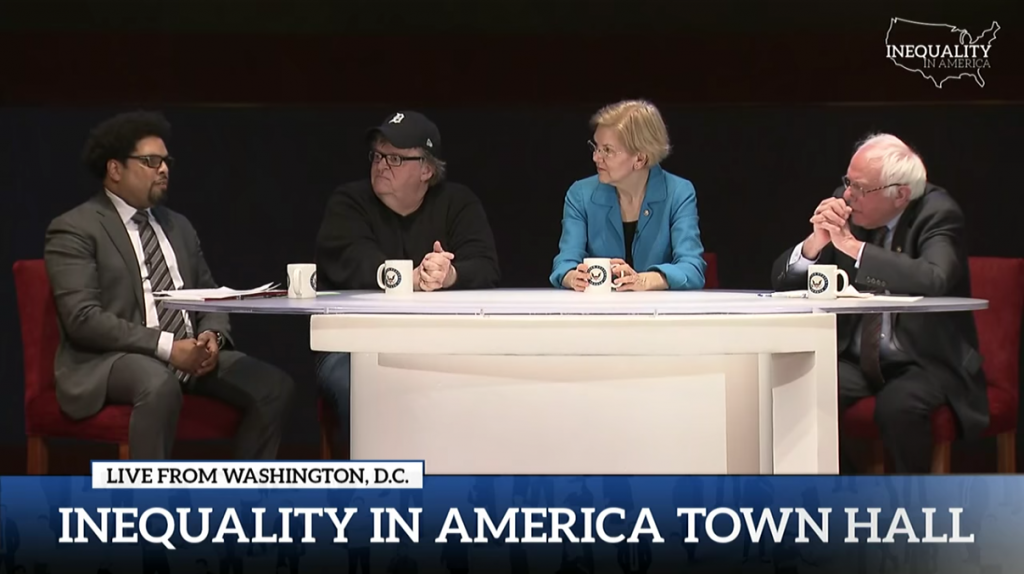
Milano and NSSR’s Darrick Hamilton Joins Bernie Sanders’ Inequality in America Town Hall
Darrick Hamilton has spoken on structural inequality in front of large crowds in the past, most recently at the American Economic Association Conference in Philadelphia, where he shared his novel idea for government-sponsored trust funds for all American children.
But Inequality in America: A National Town Hall was a totally different beast. Hamilton appeared not only in front of millions of people tuning in on YouTube, but also alongside some of the most important voices in the American progressive movement: Senator Bernie Sanders, Senator Elizabeth Warren, and filmmaker/activist Michael Moore.
“I’m not sure if you could tell, but I was pretty nervous up there,” Hamilton, professor of economics and urban policy at the Milano School and The New School for Social Research, recalled during a recent going-away party for Michelle DePass, outgoing Milano dean and Tishman Environment and Design Center director.
Despite the nerves that come with sharing a stage with such outsized political figures, Hamilton held his own. A leading stratification economist who was named to Politico’s prestigious annual POLITICO 50 ideas list, he provided a bold perspective on income inequality in the United States, the topic of the panel-discussion-style event at the U.S. Capitol auditorium in Washington, DC. More than 1.7 million viewers tuned into watch Hamilton, Sanders, Warren, and Moore discuss extreme poverty, the collapse of the middle class, the rise of oligarchy, and other pressing issues surrounding America’s yawning wealth disparity.
Sanders kicked off the proceedings with an argument he has made time and again on presidential campaign trail, in media appearances, and in speeches across the country.

“Tonight we are going to ask some questions and have a discussion with some of the most knowledgeable people in this country on issues that are rarely if ever discussed in the corporate media,” he said. “Tonight we’re going to take a hard look at why, over the last 40 years, the middle class of this country has declined while oligarchy is on the rise and why, over those 40 years, $13 trillion in wealth has been transferred from the bottom 99 percent to the top one percent.”
The point of the evening wasn’t simply to lay out the problems of inequality, Sanders said, “but to find solutions to them.” Hamilton came through with an answer that set the tone for a series of innovative solutions he proposed throughout the evening.
“The way we deal with economic precarity is we discipline the poor, we try to manage their seemingly bad behavior. We try to cajole the private sector with tax incentives to deal with our problems. This hasn’t worked,” Hamilton said. “We have a choice. We can do something else.
Instead, we can empower people directly.”
Hamilton suggested that the universal programs Sanders favors would not be enough to erase the racial inequities holding African-Americans back from socioeconomic and educational equality. He noted that Black households headed by a college graduate have, on average, less wealth than white households headed by a high school dropout.
“So when Senator Sanders proposes that we should have tuition-free public education ― absolutely, but as an end unto itself,” Hamilton said. “We exaggerate the returns from education, particularly to marginalized groups.”
Sanders, Warren, and Moore all backed popular solutions to inequality, including a $15 minimum wage, stronger unions, free college education, and paid family leave policies. Hamilton embraced stronger measures. His preferred solutions included the creation of baby bonds ― trust funds given to every American at birth ― a federal job guarantee, the replacement of private payday lenders with postal banking, and an end to academic tracking in grade school, which, he argued, often replicates racial segregation, even within relatively integrated schools.
“We have these narratives of a post-racial society, but we’re not there,” he said. “We need to create comprehensive programs so that no one is left behind.”